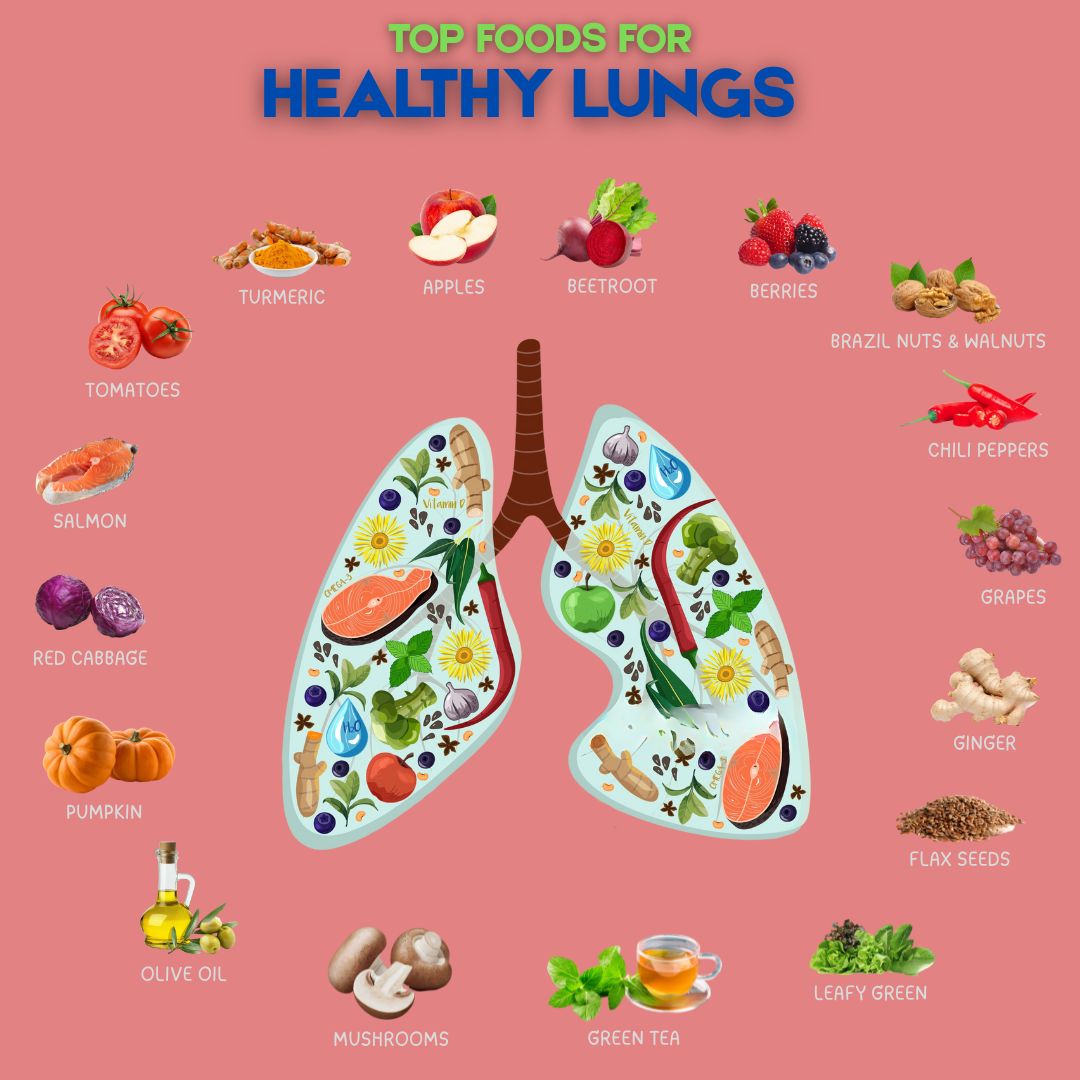🌿 Breathe Better Naturally: 16 Superfoods for Healthy Lungs
Introduction
Your lungs are your body’s gateway to oxygen, fueling every cell and powering your daily life. But in today’s world, with rising pollution, allergens, and respiratory illnesses, supporting lung health naturally has never been more essential. Imagine improving your lung function, boosting immunity, and reducing inflammation — simply by incorporating certain superfoods into your diet. This guide reveals 16 powerhouse foods scientifically known for their lung-supportive benefits.
From juicy tomatoes rich in lycopene to omega-3-packed salmon and anti-inflammatory turmeric, these foods are more than just delicious—they’re your lungs’ best friends. Ready to breathe better and feel revitalized? Let’s dive into how these natural ingredients can transform your respiratory health.
Why You’ll Love This Recipe for Lung Health
Unlike fad diets or complicated routines, this recipe for lung-boosting nourishment is simple, sustainable, and effective. It’s packed with nutrient-dense foods that taste great and offer a spectrum of benefits:
- Powerful anti-inflammatory and antioxidant effects to protect lung tissue.
- Enhanced oxygen flow and airway function for easier breathing.
- Natural immune support to fight infections and chronic lung conditions.
- Versatility to suit all meals and lifestyles, whether you’re vegan, keto, or a meat-lover.
By regularly including these superfoods, you not only support your lungs but improve overall wellness. Plus, the vibrant colors and bold flavors make eating healthy an enjoyable experience, not a chore.
Ingredients: The 16 Lung-Boosting Superfoods
To harness the full lung-supporting power, gather these nutrient-packed ingredients:
- Tomatoes – Rich in lycopene, a powerful antioxidant that reduces lung inflammation.
- Turmeric – Contains curcumin, which helps improve lung capacity and reduces airway inflammation.
- Apples – Loaded with vitamin C and flavonoids, they protect lung tissue from oxidative damage.
- Beets – Boost oxygen flow and support healthy blood pressure, benefiting lung function.
- Berries – Blueberries, strawberries, and others contain antioxidants that fight lung stress.
- Salmon – High in omega-3 fatty acids that reduce airway inflammation and improve lung health.
- Red Cabbage – Packed with vitamin C and anthocyanins to repair lung tissue.
- Pumpkin – A great source of vitamin A, which keeps lung linings strong and healthy.
- Olive Oil – Contains anti-inflammatory compounds, excellent for lungs exposed to pollution.
- Mushrooms – Support immunity and help reduce lung damage.
- Grapes – Rich in resveratrol, which improves lung elasticity and function.
- Ginger – Helps clear mucus and improves airflow.
- Green Tea – Protects lung tissue and lowers the risk of chronic obstructive pulmonary disease (COPD).
- Brazil Nuts & Walnuts – Selenium and omega-3s boost lung immunity and reduce inflammation.
- Chili Peppers – Capsaicin acts as a natural decongestant, clearing airways.
- Flax Seeds & Leafy Greens – Provide ALA and other nutrients to reduce inflammation and cleanse blood.
For more details on foods that support lung health, check out the American Lung Association’s nutrition page.
Necessary Tools for Preparation
Incorporating these superfoods into your meals can be simple with the right tools:
- High-powered blender: For smoothies with berries, flax seeds, and leafy greens.
- Sharp knives and cutting board: To chop tomatoes, apples, cabbage, and chili peppers safely.
- Non-stick skillet or sauté pan: Ideal for cooking salmon, mushrooms, and beets.
- Steamer or roasting pan: Perfect for preparing pumpkin, beets, and cabbage while preserving nutrients.
- Tea infuser or kettle: For brewing antioxidant-rich green tea.
Ingredient Swaps and Additions
Adapt these superfoods to your taste and availability:
- Tomatoes: Use sun-dried tomatoes or tomato paste for concentrated lycopene.
- Turmeric: Swap with ginger powder if fresh turmeric is unavailable.
- Apples: Pears or pears can provide similar antioxidants.
- Beets: Try cooked carrots or sweet potatoes to support oxygen flow.
- Berries: Frozen berries are a great year-round option.
- Salmon: Substitute with mackerel, sardines, or plant-based omega-3 sources like algae oil.
- Red Cabbage: Use purple kale or Brussels sprouts for a similar vitamin C boost.
- Pumpkin: Butternut squash or carrots offer comparable vitamin A benefits.
- Olive Oil: Avocado or walnut oil make excellent anti-inflammatory alternatives.
- Mushrooms: Shiitake or maitake are especially immune-supportive.
- Grapes: Blueberries and cranberries also provide resveratrol.
- Ginger: Fresh turmeric root can also clear mucus.
- Green Tea: White tea or herbal teas with antioxidants can be complementary.
- Brazil Nuts & Walnuts: Almonds and chia seeds are good substitutes for selenium and omega-3s.
- Chili Peppers: Cayenne or paprika can add capsaicin and spice.
- Flax Seeds & Leafy Greens: Chia seeds and spinach are excellent additions.
For more ideas on plant-based substitutions, visit Forks Over Knives.
Step-by-Step Instructions: Lung-Boosting Superfood Salad
Ingredients:
- 1 cup chopped red cabbage
- 1 medium apple, diced
- 1/2 cup beets, steamed and cubed
- 1/4 cup blueberries or mixed berries
- 1/2 cup cooked salmon, flaked
- 1 tablespoon flax seeds, ground
- 1 tablespoon olive oil
- 1 teaspoon turmeric powder (or fresh turmeric root, grated)
- 1 teaspoon ginger, grated
- Juice of 1 lemon
- Salt and pepper to taste
Instructions:
- Prepare the base: In a large bowl, combine chopped red cabbage, diced apple, steamed beets, and blueberries. These colorful ingredients provide a variety of antioxidants and vitamins essential for lung health.
- Add protein and seeds: Gently fold in the flaked salmon and sprinkle with ground flax seeds. These ingredients add omega-3 fatty acids and ALA, reducing airway inflammation.
- Make the dressing: In a small bowl, whisk together olive oil, lemon juice, turmeric, ginger, salt, and pepper. Turmeric and ginger act as potent anti-inflammatories and help clear airways.
- Combine and toss: Pour the dressing over the salad and toss gently to ensure all ingredients are coated without bruising delicate fruits and fish.
- Serve immediately for the freshest taste and maximum nutrient retention.
Pro Tips for Success
- Use fresh, organic produce when possible to maximize nutrient intake and avoid pesticides that can irritate lungs.
- Grind flax seeds fresh before adding to meals for better absorption of omega-3 fatty acids.
- Don’t overcook vegetables to preserve vitamins and antioxidants. Light steaming or raw consumption is best for lung-supportive nutrients.
- Pair turmeric with black pepper to enhance curcumin absorption dramatically.
- Experiment with spices like chili peppers to naturally clear your airways, but start with small amounts to avoid irritation.
Serving Suggestions
- Enjoy the lung-boosting salad on its own or over a bed of leafy greens like spinach or kale for an extra nutrient punch.
- Add a side of roasted pumpkin or steamed mushrooms for warming, nutrient-rich additions.
- Serve with a warm cup of ginger and turmeric tea to soothe airways and fight inflammation.
- Incorporate berries and flax seeds into morning smoothies for an easy daily lung cleanse.
- Use olive oil and turmeric-based dressings on roasted vegetables or grilled fish to enhance flavor and health benefits.
Explore our collection of Healthy Salad Recipes to keep your meals exciting.
Storing and Reheating
- Salads with fresh fruit and fish are best consumed immediately but can be refrigerated for up to 24 hours in airtight containers.
- Cooked beets and salmon can be stored in the fridge for 2–3 days and gently reheated to avoid drying out.
- Ground flax seeds should be stored in an airtight container in the fridge to prevent rancidity.
- Turmeric and ginger dressings can be made in advance and refrigerated for up to 3 days.
- Avoid reheating delicate fruits or berries to maintain their antioxidant properties.
Nutritional Information (Per Serving of Lung-Boosting Salad)
- Calories: 350
- Protein: 22g
- Total Fat: 18g
- Saturated Fat: 3g
- Carbohydrates: 25g
- Dietary Fiber: 7g
- Sugars: 10g
- Vitamin C: 85% DV
- Vitamin A: 60% DV
- Omega-3 Fatty Acids: 1.8g
- Selenium: 15% DV
FAQs
1. How often should I eat these lung-healthy foods?
Aim to include several of these foods daily or at least 4–5 times a week for ongoing lung support.
2. Can these foods help people with asthma or COPD?
While they can reduce inflammation and support lung function, always consult your healthcare provider for chronic conditions.
3. Are there any allergy concerns?
Some ingredients like nuts or seafood may cause allergies; substitute accordingly with seeds or plant-based proteins.
4. Can I take turmeric supplements instead of using the spice?
Supplements can be effective but consuming turmeric in food enhances absorption when combined with black pepper.
5. Will these foods help smokers improve lung health?
These foods provide antioxidants and anti-inflammatory benefits, which can help mitigate some damage but quitting smoking is essential.
Conclusion
Supporting your lungs naturally through diet is a powerful, delicious way to improve respiratory health, reduce inflammation, and boost immunity. By incorporating these 16 superfoods regularly, you’re investing in better breathing and a higher quality of life. Remember, the path to lung health is not just about avoiding harm but actively nourishing your body with nature’s best.
Explore more nutrient-packed recipes like our Immune-Boosting Soups and Anti-Inflammatory Smoothies to keep your wellness journey fresh and exciting.







